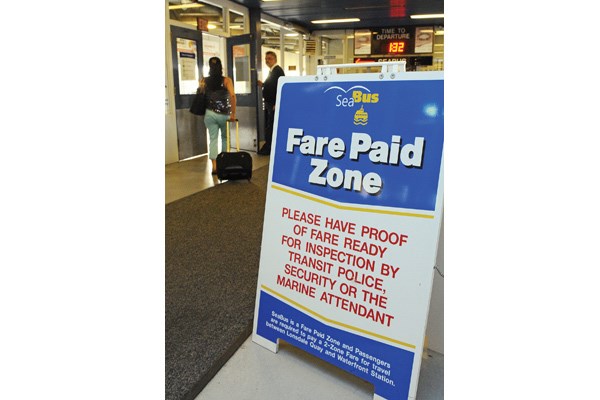ANGRY bus riders and privacy advocates want to put the brakes on a new TransLink program that would leave some users paying two fares where they used to pay one.
The Compass card, scheduled to be released later this year, would allow transit users to tap their way past the new SkyTrain and SeaBus fare gates throughout Metro Vancouver.
However, those new gates will not recognize bus tickets, potentially leaving two million bus riders paying a second fare when they jump on the SkyTrain next year.
"I think it's unfair because, by TransLink's own admission, at least 6,000 people every single day will be forced to pay twice," said transit user Glyn Lewis.
Lewis marked his displeasure by spearheading an online petition that characterizes the system as absurd. After two days, 3,567 disgruntled riders had added their John Hancock to the petition at change.org.
The initiative is intended to put pressure on TransLink, partially on behalf of riders who don't have much money. "It's going to make transit less accessible, especially for lower-income earners," Lewis said.
Putting new fare boxes on each bus to complement the Compass system would cost $25 million, according to TransLink.
However, there should be some method to trade your bus ticket for a rail pass at SkyTrain and SeaBus stations, argued Lewis.
"I can't imagine that's going to cost $25 million," Lewis said. "We looked at that as well, too, and that had a cost of about $9 million," explained TransLink spokesman Derek Zabel.
Most riders don't want TransLink to spend money on a new system for redeeming bus tickets, Zabel said, explaining the corporation had worked with numerous focus groups to reach that conclusion.
"We're trying to be as fiscally responsible as possible and our customers told us they preferred that we didn't spend that type of money on replacing fare boxes," he said. "Instead, focus on rider education."
No personal information will be encoded on the card, according to TransLink, who stated the Compass card would contain only a unique number and the current monetary value loaded on the card by its user.
But that may soon change, according to Vincent Gogolek, executive director of the B.C. Freedom of Information and Privacy Association.
There is an effort afoot to link the Compass cards with the province's ID cards, Gogolek said, describing the transit pass as "convenient and creepy."
A Ministry of Transportation report states the ID cards "could replace or augment bus passes."
The report also describes the critical struggle for many businesses to access reliable identity information.
"They're saying, 'Oh, we had a few conversations with them about this.' Well here it is in the Ministry of Transportation's plans done presumably in 2011," Gogolek said. "It doesn't sound too tentative to me."
Another Ministry of Transportation report states that there is a plan to sync B.C. identity management services with the Compass card.
Introducing a digital wallet could result in lifting a veil on a myriad of personal information, Gogolek warned. "What happens when you lose it and it's the link to all this information? Credit cards, bus pass, everything else."
Because the Compass card requires users to tap in and tap out upon arriving and departing from transit hubs, the system amounts to surveillance, Gogolek said. "They know your travel pattern. Why wouldn't they try to make some money off that and sell it to Starbucks?" Gogolek said he may have been less concerned if not for recent government software missteps, including the scrapped student information system, known as BCeSIS, as well as the child welfare initiative Integrated Case Management. That $182-million government data-sharing program was dubbed a "colossal failure" by representative for children and youth Mary Ellen Turpel-Lafond.
"The same people who brought you those victories and successes are bringing you this," Gogolek said.
For an adult who regularly travels through three transit zones, the Compass card could provide savings of 14 per cent compared to current prices. Customers can load up their Compass card online, at vending machines or by phone. If a rider loses their Compass card, any credits can be transferred to a new card.
Currently, TransLink's focus is on ensuring the technology works, according to Zabel.
"We're going to have a transition period that'll extend into 2014 and we're not going to close those gates until we're absolutely certain that people know how to move freely throughout system."



